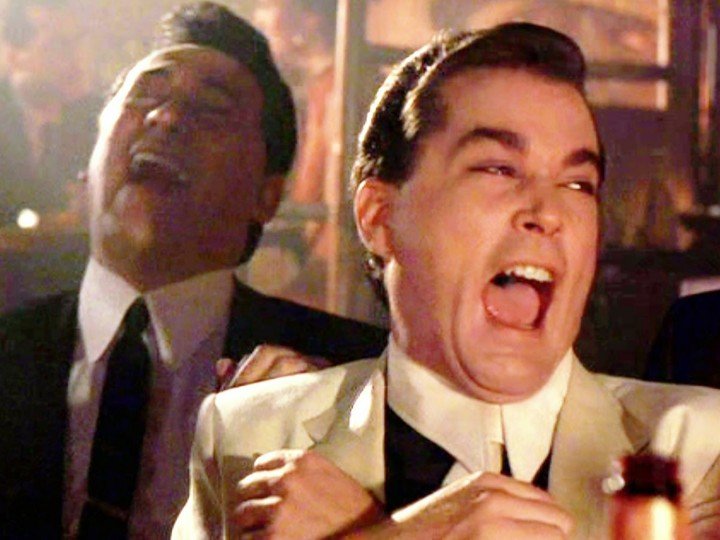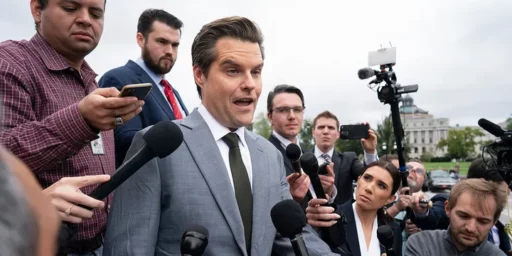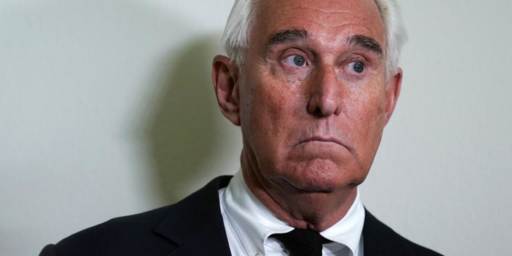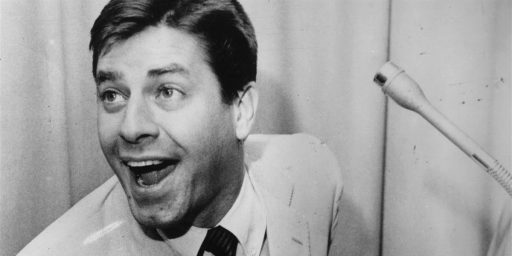This Is Why I Don’t Like Gangster Movies
You have to be suspicious of people who enjoy gangster movies a bit too much.

Anyone who knows me is well aware of how much I love movies. Classic Hollywood especially, but also modern Hollywood. American and international. Comedies, dramas, SF, thrillers, film noir, you name it, I like practically every genre…Except for a couple.
One of those is gangster movies. It’s not to say that they’re all bad, or distasteful. The Godfather parts I and II are indeed great films. I’ve enjoyed some character studies that center on criminal characters, such as Sexy Beast. There are some really good little movies in which organized crime figures prominently, such as Gun Shy and Crime Spree. And there are good international movies, too, such as Le Samourai and Yojimbo (think about it).
The aspect of gangster movies that makes me queasy aren’t necessarily the films themselves, but the overlarge market for them. The Departed might have been a great movie, but one of my strong reactions to it was, “Again, Scorsese, with the gangsters?” And, of course, you have to wonder about the people who enjoy watching them too much, and too often. Goodfellas, The Untouchables, and Reservoir Dogs are iconic movies, but they’re not something I prioritize watching again. But there are people who really do enjoy these films as “rewatchables,” in spite of, or because of, scenes of extreme violence.
But is it just a matter of taste? When someone watches for the 10th time a scene of one human being carving up another with a knife, or beating another person with a baseball bat in front of a room full of people too frightened to object, do we just say De gustibus and move on? We can ask the same of fans of “splatterpunk” horror movies. Where is the line that, when crossed, appetites become unhealthy, or bespeak of some deeper problem?
The line may be admiring or emulating a gangster, not just watching one. Which brings us to today’s news:
As Roger Stone prepared to stand trial in 2019, complaining he was under pressure from federal prosecutors to incriminate Donald Trump, a close ally of the president repeatedly assured Stone that “the boss” would likely grant him clemency if he were convicted, a recording shows.
At an event at a Trump property that October, Rep. Matt Gaetz (R-Fla.) predicted that Stone would be found guilty at his trial in Washington the following month but would not “do a day” in prison. Gaetz was apparently unaware they were being recorded by documentary filmmakers following Stone, who special counsel Robert S. Mueller III had charged with obstruction of a congressional investigation.
“The boss still has a very favorable view of you,” said Gaetz, stressing that the president had “said it directly.” He also said, “I don’t think the big guy can let you go down for this.”
It’s old news that Donald Trump aspires to be a kind of Mafia boss, and certainly talks like one. He enjoys twisting and breaking laws and norms, demanding loyalty from his subordinates, giving no loyalty in return, putting self-enrichment above all else, speaking lies more often than truths, promoting a cartoonish worldview of toughness, and binding people to him through fear and ambition. That much was clear even before he came down the golden escalator.
Unfortunately, he’s not alone. There are people who are part of the Trump Cinematic Universe, or want to be, who are equally enamored with the gangster life. For them, being part of la famiglia is far more important than decency, honesty, the rule of law, or all the other fairy tales for the rubes. They embrace that combination of nihilism and smugness that are the hallmarks of being, in their minds, a true gangster. And that mindset leaves no rule sacred—not the electoral laws of states like Georgia and Pennsylvania, not the federal laws on corruption and witness tampering, not the Constitution itself. Nothing matters but the modus vivendi among fellow criminals, and the exigencies of the moment.
From one perspective, it’s good that Trump has made the mob-like dynamics of his shambolic “organization” so clear. It’s equally clear that anyone willingly entering that cabal, or wishing to emulate its worldview and methods, is doing so with eyes open, whether they are Fredo-like characters such as Matt Gaetz, or Tom Hagen-like personas like Steve Mnuchin. Some of them are opportunists, who nonetheless deserve all our opprobrium for joining the mob. Others are enthusiasts, who revel in breaking the rules, or like Trump, can’t imagine doing anything straight.
I can’t say what movies are on the watch list of Gaetz, Stone, Bannon, Giuliani, and the rest of the syndicate, but I have my suspicions. There’s a big difference between enjoying the occasional gangster movie, and wanting to be the main character in it.






I like re-watching goodfellas and casino sometimes. I enjoy how the combination of musical choices and cinematography come together in a slick package with some really good dialogue.
@Matt:
Most American “gangster movies” seem to me to be essentially morality tales.
The criminals may have a superficial sheen of style and strength, but it’s generally shown to be just a facade built upon a morally flawed foundation.
See Goodfellas for the classic example.
The films that rather trouble me are the Guy Ritchie Brit gangster types: Lock, Stock and Two Smoking Barrels being the archetype.
The criminals are variously hard, stylish, sometimes absurd-but-laddish, cocky, quippy.
Even when being scary they are cartoonishly so.
It misses the basic tendency to moral degeneracy that underlies the characters of Scorsese’s films (and others).
See also, as similar to Ritchie, Quentin “You do realise I’m an auteur, don’t you?” Tarantino
I dislike gangster movies, precisely because they often celebrate something that should be condemned. Imagine movies that portrayed terrorists like they do gangsters. the GQP would nuke Hollywood.
@JohnSF:
Second thoughts:
The ur-Brit-gangster caper movie is, of course, The Italian Job
Watch that and you’ve already seen every Guy Ritchie film.
Watch Get Carter and you may begin to see why “glamorous gangsters” is such a load of b.s.
When I was in Junior College (1966-1968) I knew two sisters whose father was rumored to be associated with organized crime. They missed a few classes in the middle of a semester. Their father was dead. Not of natural causes.
When the two returned to classes there was nothing glamorous about the sorrow and fear they were so obviously living with.
The movies have always had lots of gangsters as protagonists. The careers of Humphrey Bogart, George Raft, and James Cagney are full of such portrayals. In the early 1930s Paul Muni was a fugitive from a chain gang who lives outside the law. Not just the movies; Woody Guthrie made a song about Pretty Boy Floyd and not the FBI. “Whiskey in the Jar” has been sung for 3-400 years; I especially like the Thin Lizzie version. Pre literate peoples had characters like Raven and Coyote. I could argue that the Achaeans besieging Troy were gangsters; wasn’t Agamennon simply the capo di tutti capi?
The hero’s journey is a very common theme in many stories. The gangster’s conflict is another common theme.
I have long pondered the question of why people like gangster movies so much. It’s one of those “I can love individuals, but I kind of hate humanity” things for me. But I have some thoughts.
In the hands of some, the gangster tale is a story that does not involve law and government and everyday concerns. These are stripped away so that other concerns can be addressed without any particular narrative interference from mundane concerns. Normal people would go to the police or the FBI, but that option is off the table, which makes for a more interesting story.
In the hands of some.
Honestly, Tarantino mostly serves up stories of redemption and retribution, dressed up in cartoonish violence. He schooled on blaxploitation films, among others, as a kid.
I recall an online discussion about The Sopranos. Someone expressed hating the psychotherapy scenes to the point they fast-forwarded them during re-watches.
But without that framing, we do not have the show, or at least something nearly as interesting. More importantly, you don’t see the weird tension between the rationalizations he makes for his behavior and the conscience he buried long ago that still sometimes surfaces. That tension is there in other arcs and scenes, but the therapy sessions crystallize it.
Not to mention, Tony’s therapist is, in some ways, a stand-in for the American population. She wrestles with the tension between her oath to treat a patient in need, whether the relationship goes beyond ethical boundaries, and how it’s affecting her own mental health. And at one point, just as she is ready to transfer care to a Cognitive Behaviorist, she experiences a horrifying assault, and keeps him as her patient because that relationship offers a feeling of safety. Multiple times during their time together, things she has said led Tony to a decision that helped his criminal pursuits.
Chase seems to have wanted the show to hold a mirror to America as a whole and one to American viewers as individuals. But if all most of them remember is the violence and share Tony’s nostalgia for the North Ward, maybe that’s the most damning reflection of all.
I sometimes ponder the impact on Americans’ world view of a never-ending torrent of movies and TV shows about crooked cops and evil intelligence agencies. Most people believe fiction has some basis in reality, so when they see an endless procession of crooked cops and sinister ‘deep state’ agencies undermining American values and the justice system, it must surely create a degree of cynicism about the integrity of the actually existing organisations.
In similar fashion the fascination so many Americans have with owning guns must be at least partly caused by the countless movies and TV shows in which a gun was the means for a man (rarely a woman) to behave heroically and win the grateful respect of his community.
One of the reasons I wanted to write this post is my confidence that I’d get thoughtful, interesting responses from the regulars. You did not disappoint.
@Kurtz:
Missed Sopranos plot twist:
Psychiatrist realises her life is in imminent peril, shoots Tony in the head while on couch, hires/marries ex-CIA type, uses information from sessions to eliminate entire families sneakily methodically and completely, on basis of not being an Italian idiot, then has the dilemma of does she end the entire organized crime setup in the NY/NJ area, or replace it as the new psychiatrist gangsta overlord!
“She offered a therapy he couldn’t refuse.”
@Kingdaddy:
Then I turned up. 🙂
@JohnSF:
I’d go back a little further to Odd Man Out, a great little noir movie. It’s a crime movie, but there’s also militant Irish nationalism. Bad things happen to a lot of people. Plus, it stars James Mason. Some very bleak settings, and an even bleaker story.
Speaking of terrorism and organized crime, the similarity between the two types of organizations is not coincidental. https://armsandinfluence.typepad.com/armsandinfluence/2006/02/counterterroris.html
@JohnSF:
Two words: “Layer Cake”.
@Kingdaddy: @EddieInCA:
Both good film suggestions.
And Le Samouraï is probably in my top ten, along with City of God.
@JohnSF:
I’ve wondered if one could make the case that Tony’s world was all in the head of a bored Psychiatrist who hates her patients.
@JohnSF:
Also, I co-sign your plot twist on the following conditions. The ex-spook she marries is played by John Goodman. He shall wield a shotgun and only have one line, which he screams repeatedly.
Kingdaddy, for me it’s even simpler. Growing up, I knew people whose parents ran various local organizations with international connections. In college, I knew people who organized international distribution of recreational pharma. To me, most of the “gangsters” in the movies are 2-D cutouts of the people I knew, and therefore uninteresting except as inadvertent parody.
I don’t watch Tarantino and his modern ilk, if for no other reason than Bugs Bunny did most of what he’s done in a more entertaining manner. And Lee Marvin, James Mason, and Terrance Stamp did it better half a century or more ago.
@JohnSF: , @EddieInCA: , @Kurtz:
I’d also recommend The Limey, if only to enjoy Terrance Stamp’s vacation in sunny LA.
@Flat Earth Luddite:
The Limey is awesome.
This is why I don’t like people who don’t like gangster movies.
Hey, somebody had to say it.
@OzarkHillbilly:
I’m interested in the different approaches to violence. I write quite a few violent scenes myself, albeit in books.
In The Godfather problems are solved by violence. Violence generally works. Michael takes over the casino through a series of murders. Smart, deliberate, calculated violence. Ruthlessness carries an emotional cost but is nevertheless effective. It works.
In the Sopranos violence shows Tony’s impotence, his gradual loss of control, despite his ability to employ violent means. He can’t control his own mind, he can’t control his kids. And he can’t even pull off violence with style or efficiency.
In Peaky Blinders the violence is a blend of calculation and raw, animal fury. Sometimes it solves problems, but just as often it exacerbates them. There’s a duality – Tommy the calculating and Arthur the animal. Message: the brute beast is a weapon that can be used effectively, but it can also dig the hole deeper.
In The Wire violence is a fact of life, like gravity, it solves nothing because there is no expectation of a solution, everyone is on a path to an inevitable end. Omar is a bit of an exception, carrying out his robberies and murders with a vaguely moral motivation but the result is just more squalid tragedy.
When I write violence I always pair it with consequences and never glamorize it. I fall closest to the Peaky Blinders approach – sometimes planned, sometimes nothing more than sadism. It leaves a mark on the perpetrator of violence and on innocents. But I’m probably closer actually to a western than to the gangster ethos, more High Noon than Godfather.
I’m not a fan of Quentin Tarantino’s stylized, glamorized violence. It’s often too Itchy and Scratchy for me, cartoonish. I get the feeling off him that he’s a guy who wants the vicarious thrill but is not himself capable of violence and may be a bit of a coward. (Most people are, and he’s genuinely a very talented guy.)
One pet peeve: shoot-outs where criminals act with the training and tenacity of special forces soldiers. Crooks are not soldiers. They may well be brave, but I suspect 90% of gangsters in actual gun fights are more Brave Sir Robin than SEAL Team Six.
@Ken_L: On the other hand, we have the “Dirty Harry” genre of cop vigilante movie in which the good cop has to go outside the law for justice. Makes you wonder if they have an effect on how people and cops view cop on citizen violence.
You can probably include a lot of westerns in this group as well.
@Kingdaddy:
I admit it, I like the gritty crime genre.
I liked The Sopranos and Goodfellas for essentially the same reason: both portrayed mob characters for what they were, working career criminals. Not much glamor in the lives of the characters in both. Tony lived in a nice but relatively plain suburban home in New Jersey, and the places he and his ‘associates’ frequented were plain social clubs. Goodfellas was much the same; Henry Hill and Pauly lived in plain homes, not mansions.
This was very unlike the two Godfather movies which portrayed mob characters and mob families as royalty, and indeed the Corlieones lived in an estate.
I prefer the The Sopranos and Goodfellas, those two seem more reality based. The Godfather 1+2 movies, which I too enjoyed, was more of a fable, favorable PR for rich trash crime bosses.
@BugManDan: Interesting that you should mention Westerns. I was having a conversation with a fellow writer some time ago and we agreed that the greatest Westerns (Stagecoach, Shane, High Noon, The Searchers) were great in part because they didn’t shy away from exploring the dark side of the “good guys.”
@SC_Birdflyte: I love a good western. I always liked the ambiguous hero ones best (spaghetti westerns, etc).
There is an interesting back and forth between samurai movies and westerns. Kurosawa has said that he based his samurai movies on earlier westerns. And a number of westerns, especially from the late 60s are samurai movies with cowboys. And these especially show the hero as a mixed bag.
@Mister Bluster:
When I lived in New Jersey long ago, a black car pulled up to the sidewalk in front of the local Athletic Club in one of the very rich coastal communities and gunned down a man on the steps. The man was very well regarded locally, donating generously of both time and money to assorted charities. He refused interviews, and when pinned down at some point said that he became wealthy through “private financial services.”
After his death, the local paper ran a story they’d been sitting on for years: he had been a money manager for the mob. About half the elected city government went to the funeral because of his local good deeds. About half stayed away because of the mob connection. The shooters were never caught. The assumption was that he was collateral damage in some sort of small war going on between families.
@Kingdaddy: Heh. I’ll be honest, I recognized that right off the bat but damned if I could place it. Thank dawg for the google, otherwise I’d never get another decent night’s sleep.
2 AM, rolls onto back: “Damn. What movie was that???”
@Michael Reynolds: Tarantino’s violence is so over the top, he’s got to making fun of something, I’m just not sure what.
@Michael Cain: Or it might just have been the celebration of his retirement from the business.